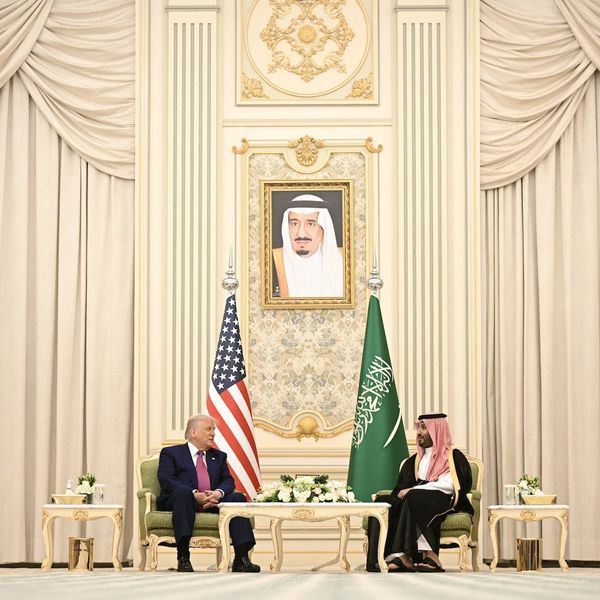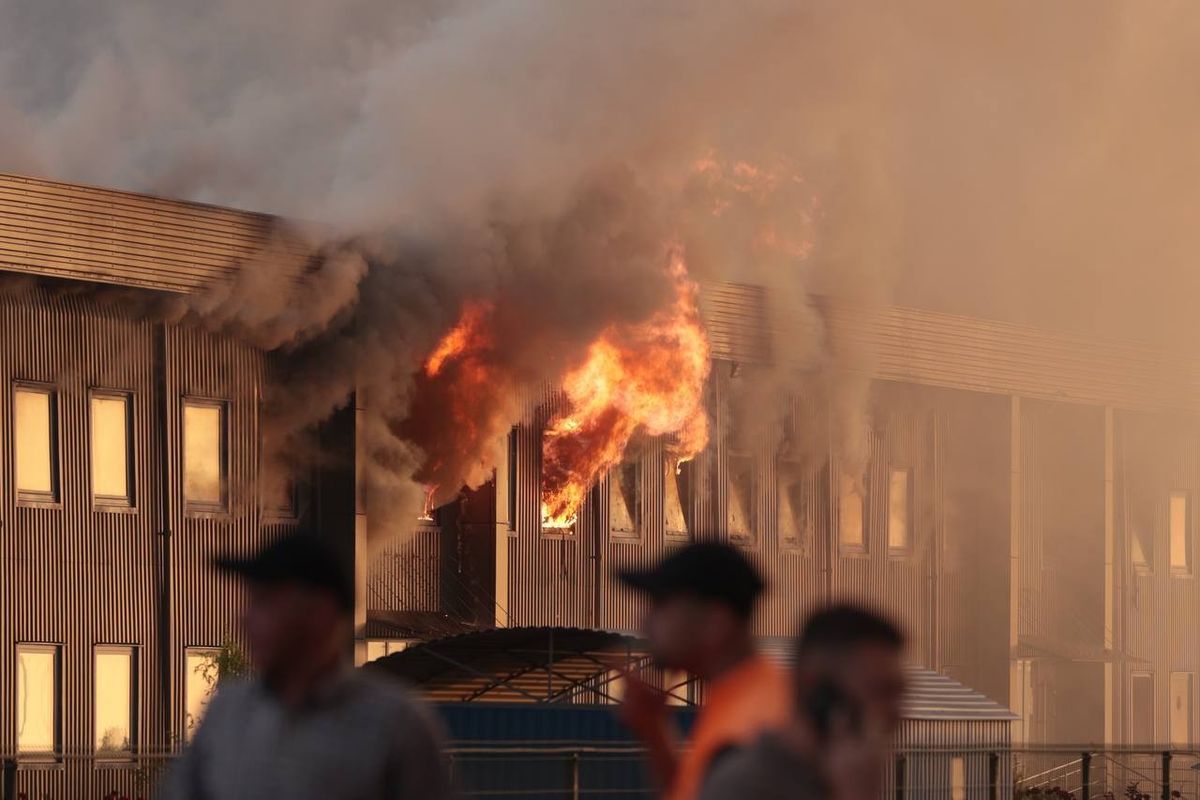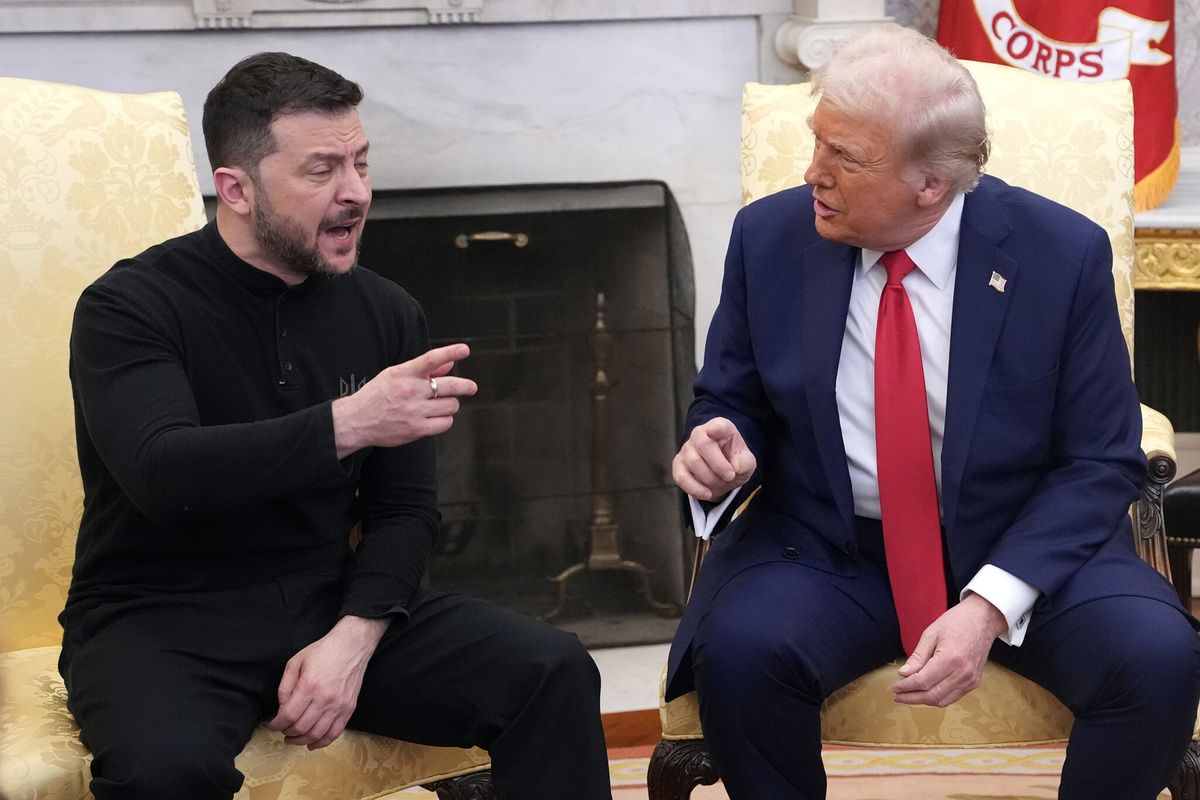OPINION – President Trump’s nominee for the top legal job in the Office of the Director of National Intelligence, Patrick Hovakimian, gave limited answers to questions from Democratic members of the Senate Intelligence Committee at his confirmation hearing last Wednesday.
His performance all but guarantees a partisan line when his nomination comes up for a vote.
Currently an Associate Attorney General at the Justice Department, Hovakimian’s approval would place a top aide to Attorney General William Barr in a key legal position under Trump-appointed Director of National Intelligence John Ratcliffe, a Trump loyalist and former Republican House member.
The President, who has been fighting a running battle with the intelligence community, has been replacing fired officials with loyalists in an attempt to control disclosure of any intelligence information which could damage his chances for re-election.
Hovakimian, at the hearing, went out of his way to prove his bona fides to Trump and members of his administration. In his opening statement, Hovakimian thanked not only the President and DNI John Ratcliffe, but also “my current bosses, Attorney General Bill Barr and Deputy Attorney General Jeff Rosen for their support throughout this nomination process.”
As his testimony went on, he stuck to the administration line and avoided saying anything that could be construed as being even slightly critical of Trump policies or actions.
For example, the Intelligence Committee’s pre-hearing questionnaire asked if Hovakimian agreed with “the January 2017 Intelligence Community Assessment that concluded that Russia interfered in the 2016 election to benefit Donald Trump, an assessment confirmed by the Senate Select Committee on Intelligence.”
In his written answer, Hovakimian referred to Ratcliffe’s answers to the committee at his confirmation hearing where the former congressman agreed that Russia interfered with the 2016 election. But Hovakimian ducked the part about Moscow’s support of Trump, saying he was “not familiar with the specific intelligence underlying” that part of the assessment.
When Sen. Mark Warner (D-Va.) asked the same question at last Wednesday’s hearing, Hovakimian again recited Ratcliffe’s earlier statements. When Warner raised the question about the assessment that Trump was Russia’s “favored candidate,” Hovakimian again said he hadn’t had a chance to read the full assessment. Pressed by Warner for his view, Hovakimian said, “sitting here I have no reason to doubt” the intelligence community assessment nor the committee’s confirmation of it.
Warner described that “as a careful answer…but I am concerned about that.”
Hovakimian showed his selective preparation when Sen. Diane Feinstein (D-Calif.) questioned him about CIA’s detention and enhanced interrogation programs based on her 2014 committee investigation of what went on post-9/11 during the George W. Bush administration.
“I have reviewed the executive summary of the report that was released while you [Feinstein] were chairman,” Hovakimian said. “It was a very detailed and thorough report and from where I sit a model of congressional oversight.”
Two points are worth making. One is that the Feinstein executive summary was over 500 pages long. While Hovakimian implied he had taken time to review that, he apparently did not review the shorter, January 2017 Intelligence Community assessment of Russia’s 2016 interference in the U.S. election although he was warned it would be brought up at the hearing. The second point is that many in the CIA and even on Capitol Hill have regarded the Feinstein torture investigation as very limited because it was based solely on documents, did not interview any of the major individuals involved, and was done without any Republican members or staff participating.
Feinstein then asked if Hovakimian supported the law that limits interrogation techniques to those that are authorized in the Army Field Manual? Hovakimian said, “I support that law fully,” to which Feinstein responded, “Good, you’ve done your homework.”
However, when Feinstein asked whether he saw any issues in Trump’s firing of CIA Inspector General Michael Atkinson for his role in the whistleblower case, that helped trigger the impeachment charges, Hovakimian said he was “familiar with Mr. Atkinson being fired, I don’t know all the facts there, but I do know there is a dedicated corps of civil servants who work both in the IC and across the United States government, I’m proud and honored to be among them, and my experience has been nothing shakes these folks.”
In short, he did not want to deal with the impact of Trump’s firing of Atkinson.
During the hearing, Hovakimian also created some questions about his possible role in the current Trump administration’s introduction of federal law enforcement personnel in cities run by Democratic mayors, allegedly part of the President’s 2020 law and order re-election effort.
In describing his current Justice Department duties, Hovakimian wrote an answer to the committee questionnaire, saying he is “serving as a principal advisor to DOJ leadership” and works with Justice’s “national security components and IC partners to develop strategies not only for various law-enforcement efforts, including investigations, prosecutions and operations, but also for setting U.S. government-wide policy.”
With that as a premise, several senators asked Hovakimian about whether he had participated in any discussions at the Justice Department related to the current Trump administration decision to send federal law enforcement officers to Portland, Ore., or any other U.S. city.
Sen. Ron Wyden (D-Ore.), who announced he had told Hovakimian that he was going to raise the Portland situation, asked, “Do you believe Federal forces can control American cities over the objections of the state and local officials and away from Federal Buildings?”
Hovakimian, clearly reading from a prepared paper, responded saying, “I understand Portland is your hometown and there’s a lot going on there now. So, I do extend my best wishes to your friends and family and constituents there. Senator, I will stand firm on the idea that Americans’ right to free speech, free assembly under the First Amendment are absolutely sacrosanct, neither law enforcement nor the intelligence community should target or surveil Americans who are engaged in that activity that is entirely protected by the First Amendment. This is a bedrock principle of democracy and one that I stand by. Senator, peaceful protest is one thing and violence is another, and from where I sit law enforcement helping to quell violence…”
At that point Wyden said, “Nobody is condoning violence and I’ve repeatedly said that.” He went on to question whether the claim of violence is “a smokescreen for the federal takeover of local authority and local law enforcement.”
Hovakimian called the Portland situation “volatile” and when he again said, “I do extend my best wishes to your constituents there.” Wyden snapped back saying, “My constituents are interested in more than your best wishes. What they want to know is that these forces can’t go wherever they want over the objections of local authorities.”
Hovakimian responded, “The department is committed to enforcing the law while respecting the Constitutional rights of all people.”
Their exchanges continued and at the end Wyden called what was occurring in Portland “essentially fascist practices” and stated that Hovakimian’s views were “not consistent with the position to which you have been nominated and I intend to oppose his nomination.”
Later exchanges with Sen. Kamala Harris (D-Calif.) were just as tense.
Harris’ questions were directed at whether Hovakimian was involved “in any way in decisions to deploy law enforcement officers to the very cities [like Portland] that we have been discussing?”
SEN. HARRIS: Can you answer the question? Were you involved, or not?
HOVAKIMIAN: Senator, there are ongoing law enforcement operations in the country, you know, to protect the —
SEN. HARRIS: So, you're not gonna answer this question directly, sir? I will move on if you're not going to answer the question.
HOVAKIMIAN: I'm attempting to answer the question, Senator.
SEN. HARRIS: Were you involved?
HOVAKIMIAN: Senator, I advised the attorney general and deputy attorney general on everything under the sun, and I always bring to the table a respect for Constitutional right for the first amendment. That is something I turn to frequently when advising them.
He finally said directly he was not involved in discussions that led to sending of forces to remove protesters from Lafayette Square before Trump’s photo-op appearance before St. Johns Church.
Near the end of the hearing, Sen. Warner re-raised an issue he had asked about at the beginning of the session and had been raised later by others, namely the Justice Department Office of Legal Counsel (OLC) opinion that had temporarily blocked the CIA whistleblower’s complaint about Trump’s call with Ukrainian President Volodymyr Zelensky from being sent to Congress.
The complaint had only reached Congress because ICIG Atkinson ignored the OLC opinion and on his own sent it to the Senate and House intelligence committees, an act that led to Trump’s impeachment and later to Atkinson being fired after the Senate refused to find the President guilty.
On Wednesday, Warner called the OLC opinion “outrageous,” and asked Hovakimian if he had reviewed the situation and if whether in the future, if he would try to stop a whistleblower complaint being sent to Congress?
Hovakimian ducked a direct answer and instead said, “I have great respect for all acts of Congress and among those is the enactment of the Whistleblower Protection Act.” He followed that by saying twice, “I would ensure that they [whistleblowers] receive all protection for which they are entitled.”
Later in the hearing, Sen. Harris asked Hovakimian if he had “any awareness of this whistleblower complaint and the question of whether it should be shared with Congress?”
Hovakimian first wanted to be sure they were talking about “the whistleblower complaint from last summer and early fall that led to all those proceedings?” Meaning, I assume Trump’s impeachment.
He then said, “My understanding was the whistleblower’s complaint was shared with Congress at some point.”
When Harris pointed out “at some point there was a decision not to share it with Congress,” Hovakimian responded, “I guess my point in bringing that up senator is that I’m not exactly sure which decision you are referring to because I don’t know who made it, if it was even made. I don’t know if there was a decision made not to share it with Congress, because it was in fact shared with Congress.”
Warner said, “My understanding was that you had OLC, I believe in some consultation with the Attorney General, reaching that conclusion, which then was referred to the IG. The IC Inspector General was then stopped from performing his duties, which some of us thought was a clear contradiction of the law.”Toward the end of the hearing Warner told Hovakimian he was “pretty disappointed about how you answered my colleagues’ questions and those you failed to answer.” The one Warner focused on was the OLC opinion that held up the whistleblower complaint going to Congress and halted further investigation by the Justice Department.
Warner said Hovakimian had left him “with the impression that you are avoiding answering directly Sen. Harris’ questions.” As a result, Warner said, “You have left me with a very unsettled sense, so whether you want to address it today or in writing…”
At that point, Acting Chairman Sen. Mario Rubio (R-Fla.) intervened to say, “You might be better off in writing because the answer is complex.” Rubio restated the question as, “To the extent the Department of Justice was involved in this matter and in reaching some conclusion and determination, was that a process that you were involved in helping to reach that determination?”
Hovakimian said he would be happy to take the question for the record and do the best he can.
His answer may, or may not, shed light on the subject, but it’s doubtful it will affect his confirmation vote this close to the election.
Opinion pieces published in The Cipher Brief, express the views of the authors. The Cipher Brief Community is made up of experts from all sides of the political spectrum.
Read more expert-driven insight, analysis and opinion in The Cipher Brief














